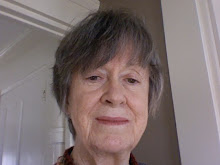Photo from Wikimedia Commons.
Some years ago, in the mid 1980s, while I was working for the International Atomic Energy Agency, I was asked to attend the first meeting on global warming held in Geneva as an observer from the IAEA. It was the only meeting on that particular subject that I attended, but it really opened my eyes to the particularly myopic view of the United States on global warming. Finally that vision seems to be sharpening and I do hope that the meetings in Copenhagen are fruitful.
Some years before that I worked for Gordon J. F. MacDonald, then at the MITRE Corporation, and he was so concerned about global warming that he posed for a picture on the cover of People Magazine where he stood on the steps of the US Capital building showing where water could rise to if global warming did become a reality. Even though Gordon was first and foremost a scientist and believed that scientific literature was the place to publish data, he thought the issue serious enough to use a popular magazine to try to promote his point of view. He was somewhat embarrassed by this. [People Magazine only goes back to 1990 on line, so I can’t find a copy of the photo]
After my years in Vienna he became the head of IIASA (International Institute for Applied Systems Analysis). Global warming was still a concern of his. If he were still alive, I’m sure he would still be pushing for people to pay attention. The National Academy of Sciences published a review of his scientific work which may be found at: http://ulmo.ucmerced.edu/~westerling/pdffiles/gmacdonald.pdf
Gordon was a holdout against the theory of plate techtonics for many years, but the evidence eventually convinced him, albeit grudgingly. If only those who do not accept that we humans are responsible for global warming would keep open minds to the data. So few people take the time to look at the data for themselves and the number of people who have taken sufficient science and math courses seems to have dwindled.
While I worked at the IAEA on the control of deep sea disposal of radioactive waste, one particular issue bugged me (and some other scientists as well). That was whether the long-held assumption that if humans are protected against the negative effects of ionizing radiation, so would other [read lesser] organisms in the environment. Some of us asked if this really was true for radioactive materials placed into the deep sea (deep meaning 4000+ meters). We know so little about the interchange of deep sea organisms with those we harvest for food, and most of the calculations and criteria involve protecting our food supply. So we made some simple assumptions and used a fairly simple model and concentrated on what might be the impacts on organisms that might live at such depths. What the modeling showed was that the assumption was likely false. If we want to protect future generations the same way we protect our own, we need to pay attention to the potential of negative effects.
Global warming has gone beyond the realm of potentiality for me. I believe it is a real threat and that future generations will suffer or benefit from what we are doing now. Do I think that Copenhagen will come up with a workable plan. I hope so. I pray so. I am also realistic. It is very complicated and countries don’t act against their perceived economic self-interest. So I am both optimistic and pessimistic. God created a wonderful world for us and gave us stewardship over it. God also gave us brains to figure out and create solutions. I sometimes wonder if God wonders if we are worth it, and then remember that God’s son came to show us we are.
Dean of Winchester
5 hours ago








2 comments:
It's wonderful to have someone write who was on the inside of this scientific inquiry! Thank you for sharing this!
I was on the periphery, really. I was just fortunate to work for a little while with Gordon and to know how passionate he was about this issue.
Post a Comment